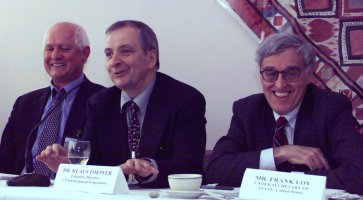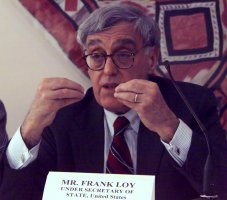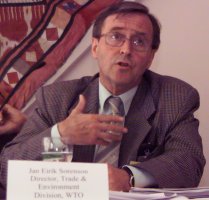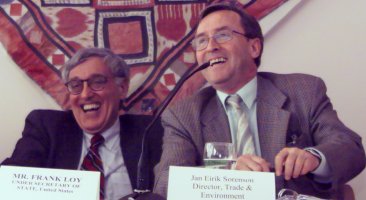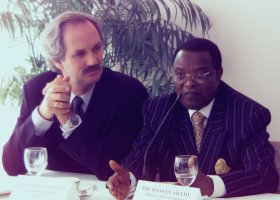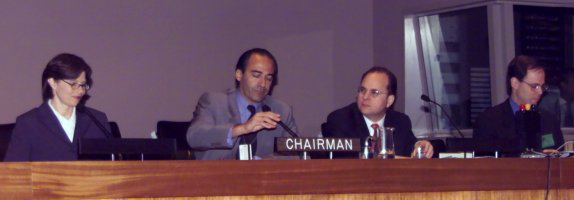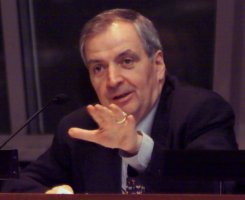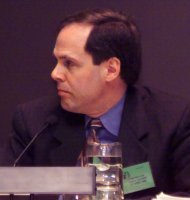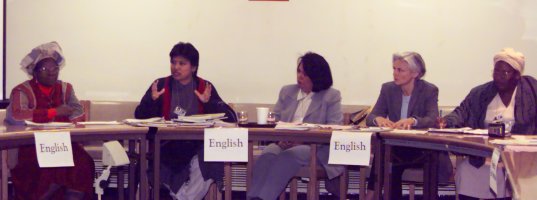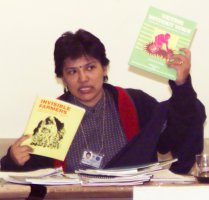| |
|
|
Jon Erick
Sorenson, Director, Trade and Environment Division, WTO, said
all WTO members agree that their needs to be more coordination
between trade and environment policy people, and highlighted the
role that trade measures can play in implementing MEAs.
|
|
|
Willem
Wijnstehers,
Executive Secretary, CITES, and Hassan Adamu, Minister for the
Environment, Nigeria
|
The Greening of Capital Markets: Can the Stock Market Promote
Sustainable Development?
|
|
Klaus
Töpfer, UNEP Executive Director
briefly reviewed UNEP's activities regarding financial institutions
and the environment; emphasized the potential role of liability
regimes in steering the market to ensure environmental protection;
and highlighted the importance of requiring pension funds to declare
their environmental policies. Noting his experience with the Blue
Angel environmental labelling scheme in Germany, he drew attention
to the difficulties associated with developing credible environmental
criteria.
|
|
|
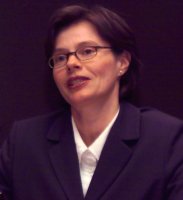 . .
|
Siri Bjerke,
Norwegian Minister of the Environment, emphasized
the potential role of private capital markets in promoting sustainable
development. She suggested that governments can facilitate this
by requiring minimum social and environmental criteria in stock
portfolios, through implementation of education initiatives, reporting
requirements, or the promulgation of guidelines. She drew attention
to the imminent criteria to be produced by the Norwegian government.
|
|
Carol
Joly, Senior Vice-President of Storebrand Investments, presented
the experience of Storebrand Investments with their socially and
environmentally responsible investments. Noting that these investments
exclude the tobacco industry as well as investment in companies
with human right violations, he highlighted their positive performance
as compared with other purely financially oriented portfolios. From
a public policy perspective, he suggested: requiring public and
private pension funds to report their social and environmental policy;
government pension funds to adopt social and environmental investments;
and including social and environmental investments as legitimate
investment within prudency rules, so as to avoid possible legal
challenges.
|
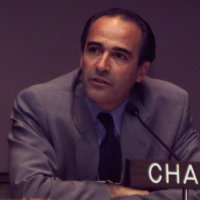
|
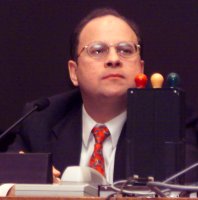 |
Henry
Fernandez, President of Morgan Stanley Capital International, outlined
the global benchmarking service of Morgan Stanley Capital International,
emphasizing the benefits associated with the operation of the free
market.
|
|
Professor
Brad Gentry
supported calls for greater disclosure of the social and environmental
policies of pension funds, urged companies to ensure that corporate
environmental reports are written with the financial community in
mind.
|
|
|
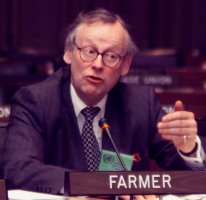
|
John
Gummer, former UK Minster for the Environment,
argued that disclosure was necessary for markets to work effectively,
and noted the significant benefits associated with the UK government's
requirement for pension funds to declare their social and environmental
policy.
|
|
Women, Pesticides and Sustainable Development
|
|
|
Saro
Jeni Rengman (left) of
the Pesticide Action Network (Malaysia) described the
working conditions for female crop pesticide-sprayers in Malaysia.
Citing physiological toxicity with chronic CNS effects, Rengman's
work involves public education programs, women's empowerment,
and facilitation with workers, unions and management.
Annik Dollaker
(above, second from right) of the Global Crop Protection Federation
/ Bayer AG Crop Protection Business Group (Belgium) outlined
action-learning on her integrated crop management training for farmers
in Brazil. Three distinct aspects which contributed to the success
of her project were (i) the training of farmer and the members of
their families; (ii) a multi-facetted participatory synergy that
resulted from housing the training sessions in a local primary school,
which drew the interest and voluntary efforts of resident (female)
teachers and their families; and (iii) the involvement of children,
who took to the principles and practices quickly and provided added
value to the purpose of these training sessions – which were all
about safety, good and bad farm practices.
|
|
World Economic Forum Environmental Sustainability
Index: Presentation of pilot results and discussion of future plans
For
more information on the Initiative of the Global Leaders for Tomorrow
Environment Task Force from the World Economic Forum and to obtain
the document of the Pilot Environmental Sustainability Index, visit:
www.ciesin.org/indicators/ES/pilot_esi/html
|
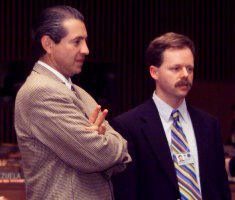 |
Marc
Levy, Associate Director for Science Applications, Center for Earth
Science Information Netork (CIESIN), and
Jose Luis Samaniego Leyva, Ministry of the Environment, Mexico
|
|
Sustainability Assessment of Trade: International
Experts Meeting on Sustainability Assesment of Trade Liberalisation
(Quito, Ecuador) March 2000
|
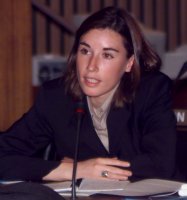 |
(left) Mireille
Perrin, Trade and Investment Unit, WWF International
(Switzerland) and David Schorr (right), Sustainable Commerce
Program , WWF - USA (USA).
|
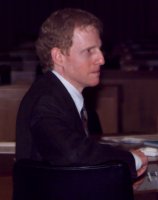
|
|
This side event
gave an overview of the International Experts Meeting on Sustainability
Assessment of Trade Liberalisation (March 2000 - Quito, Ecuador).
The meeting was held in response to the importance expressed in
the CSD for developing a framework to facilitate the assessment
of the environmental impacts of trade policies within the overall
framework of promoting sustainable development. According to the
WWF, "Sustainability Assessment (SA) is a tool to identify the economic,
environmental and social impacts of trade and to determine how best
to maximize the positive effects and minimize adverse impacts. In
comparison with environmental impact assessments (EIA), an SA seeks
to examine social and development issues, as well as environmental
aspects".
SA's purpose
serves to identify factors that would inform decision-makers about
the effects of trade and contribute to trade negotiations and holds
great potential for national governments, regional coordinating
bodies and intergovernmental organizations. The position statement
of the WWF outlines the concept for SA that sees roles for multi-stakeholder
involvement.
National governments
and key stakeholders such as NGOs, research institutes, and industry
would all be involved in the design and application of SA at all
levels (local, national, and transnational).
International
organizations would need to be involved in providing financial and
technical support, advisory capacities, and in the facilitation
of transboundary SA examinations.
Work remains
to be done to further SA and this involves continuing the international
dialogue on the value of SA, providing a venue for the international
exchange of information and knowledge sharing, ensuring stakeholder
involvement, and in the development of crucial assessment methodologies
and indicators.
|

 ENB
Summary of Ad Hoc Open-Ended Intergovernmental Group of Experts on Energy
and Sustainable Development ENB
Summary of Ad Hoc Open-Ended Intergovernmental Group of Experts on Energy
and Sustainable Development
 CSD-8
Intersessionals CSD-8
Intersessionals
 Linkages
CSD page Linkages
CSD page
 UN
- CSD website with official
documents UN
- CSD website with official
documents
 ENB's
"Introduction to CSD" ENB's
"Introduction to CSD"

|


